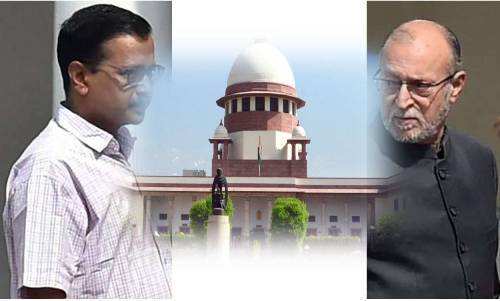Lieutenant Governor is not a state Governor – Supreme Court
The ruling of the Supreme Court further said that Delhi is not a full state and enjoys a special status, hence the L-G's role is different from that of a state Governor. Adding that the Council as well as the L-G are serving a Constitutional obligation, the ruling said, "there is no space for absolutism or anarchy in the Constitution
In a landmark judgement today, India’s apex court declared that the Lieutenant Governor of Delhi cannot act independently and needs to take into cogniscance the advise as well as assistance of the Council of Ministers of the national capital.
The ruling of the Supreme Court further said that Delhi is not a full state and enjoys a special status, hence the L-G’s role is different from that of a state Governor. Adding that the Council as well as the L-G are serving a Constitutional obligation, the ruling said, “there is no space for absolutism or anarchy in the Constitution”.
A five-judge bench headed by CJI Deepak Misra that heard the matter and concluded, comprised of Justice Ashok Bhushan, Justice Khanwilkar, Justice Sikri and Justice Chandrachud.
Earlier, the Delhi CM had said that the L-G was taking on the role of an elected government and delaying work. The Centre had also contended that for any centrally administered territory the responsibility lay on the Union Government. Today’s decision by the Supreme Court dilutes this statement considerably.
The Delhi CM termed this decision to be a victory for the people of Delhi. The apex court’s ruling specifically says that the L-G has no independent power to take decisions and must abide by the decisions taken by the elected government. Immediately after the ruling, the CM called a cabinet meeting to discuss critical projects and directed all functionaries of the national capital to function as per the ruling. Proposals related to doorstep delivery of ration, installation of CCTV being a couple of them.
Supreme Court’s ruling has laid down clear guidelines for the L-G’s conduct and delineates the powers of the two branches of the executive in Delhi. On issues related to differences in opinion, the ruling said, “the difference of opinion between the Lieutenant Governor and the Council of Ministers should have a sound rationale and there should not be exposition of the phenomenon of an obstructionist but reflection of the philosophy of affirmative constructionism and profound sagacity and judiciousness”
To join us on Facebook Click Here and Subscribe to UdaipurTimes Broadcast channels on GoogleNews | Telegram | Signal



